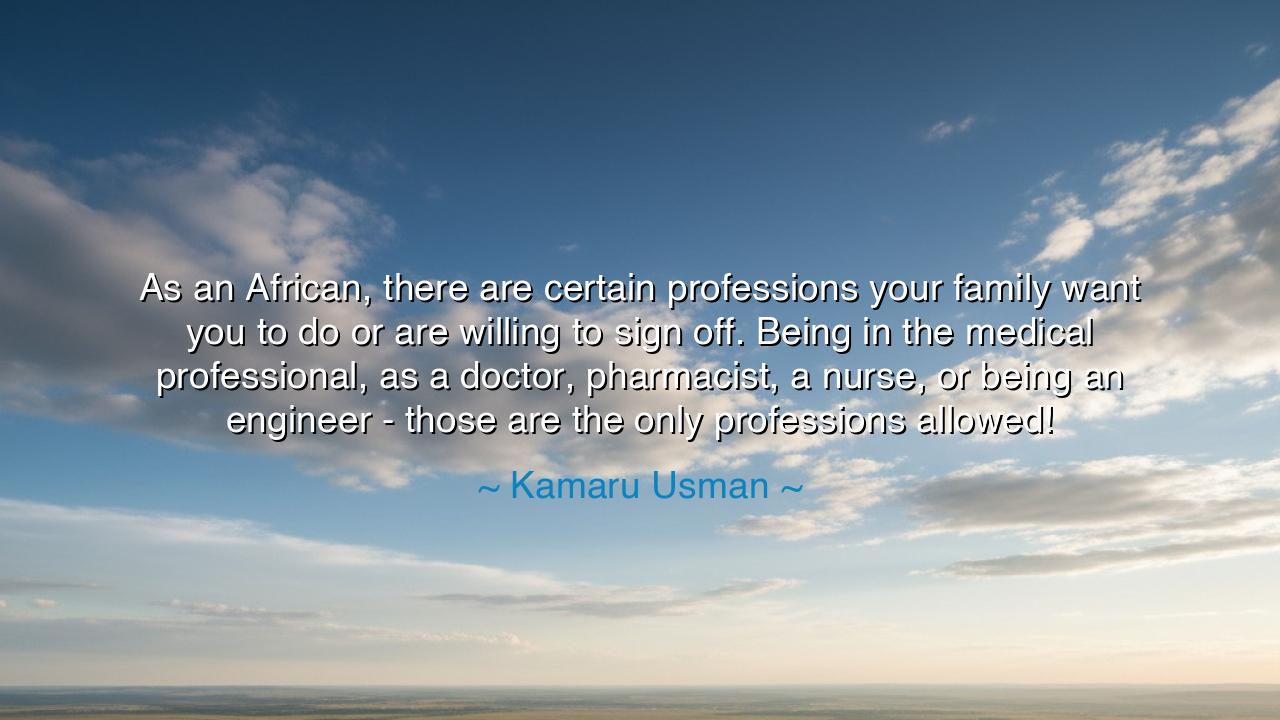
As an African, there are certain professions your family want you
As an African, there are certain professions your family want you to do or are willing to sign off. Being in the medical professional, as a doctor, pharmacist, a nurse, or being an engineer - those are the only professions allowed!






“As an African, there are certain professions your family want you to do or are willing to sign off. Being in the medical profession, as a doctor, pharmacist, a nurse, or being an engineer — those are the only professions allowed!”
Thus spoke Kamaru Usman, warrior of the arena, son of Nigeria, and champion of the world. In his words lies not mere humor, but a profound reflection on the weight of expectation — the invisible heritage that shapes the destinies of countless sons and daughters. His voice, though triumphant, carries the tone of one who has wrestled not only with opponents in the ring, but with the unseen struggle of the soul — the battle between tradition and individuality, between duty to one’s people and obedience to one’s calling.
The origin of this quote comes from the story of Usman himself — born into a family that valued education, structure, and stability, as many African families do. In his homeland, the path to respect is often narrow, defined by a few honored professions: medicine, engineering, or law. These were not just careers; they were shields against poverty, passports to dignity in a world that too often judges worth by titles and salaries. Usman’s parents, like countless others, saw these paths as the surest means of survival and success. Yet within him burned a different fire — the fire of combat, of competition, of art through discipline. To choose this path was to walk away from what was safe and sanctioned, and into the wilderness of uncertainty.
His words speak for many who live under the tyranny of expectation. In every culture, there are gates through which the young are told they must pass. The African family, forged in hardship and perseverance, often views security as sacred — a treasure earned through generations of struggle. The doctor heals, the engineer builds, the lawyer defends: all noble, all necessary. Yet, as Usman reminds us, not all souls are built to follow the same pattern. The spirit of creation, of risk, of innovation — these too are sacred fires. When suppressed, they do not die; they smolder until they burst forth, as his did, in a blaze of glory.
This story recalls the ancient tale of Odysseus, who longed to sail beyond the known world while others feared the dangers of the sea. His people valued the safety of home; he yearned for the discovery of new horizons. So too does Usman’s journey mirror that of the explorer of destiny — one who must leave behind the familiar to become what he is meant to be. His victory in the octagon was not only a triumph of strength, but of spirit. He proved that to honor one’s roots does not mean to remain bound by them. One may step beyond tradition not out of defiance, but out of devotion — to fulfill the full measure of what one’s ancestors dreamed possible.
In his words, “those are the only professions allowed,” there is a touch of irony, but also of truth. The boundaries set by fear and love are often the hardest to break. Parents seek to protect their children from the uncertainty they endured, and in doing so, they sometimes chain them to comfort. Yet Usman’s life teaches that greatness requires discomfort — that the pursuit of purpose demands courage greater than the desire for approval. In choosing to become a fighter, he did not reject his family’s values; he redefined them. He brought to his discipline the same dedication, precision, and honor that his parents admired in medicine or engineering. In doing so, he showed that greatness wears many forms, and that excellence itself is a universal language.
The deeper lesson of his quote is this: every generation must expand the definition of what is possible. The elders built paths that led from survival to stability; the children must now build paths that lead from stability to fulfillment. The physician heals the body, the fighter inspires the will — both serve humanity in their own way. What matters is not the title, but the truth of one’s calling. To follow one’s heart courageously is to add to the wealth of one’s culture, to widen its horizons rather than abandon them.
So, my listener, take this teaching as both comfort and challenge. Honor your roots, but do not be confined by them. Be grateful for the walls that sheltered your childhood, but be brave enough to build doors where none exist. Your ancestors endured so that you might dream; your duty is to dream so that future generations may live free. In the end, Kamaru Usman’s words are not only about careers or culture — they are about liberation. The truest gift you can offer your family and your people is to live fully the life you were born for, and in doing so, to show that greatness, like the human spirit, knows no bounds.






AAdministratorAdministrator
Welcome, honored guests. Please leave a comment, we will respond soon